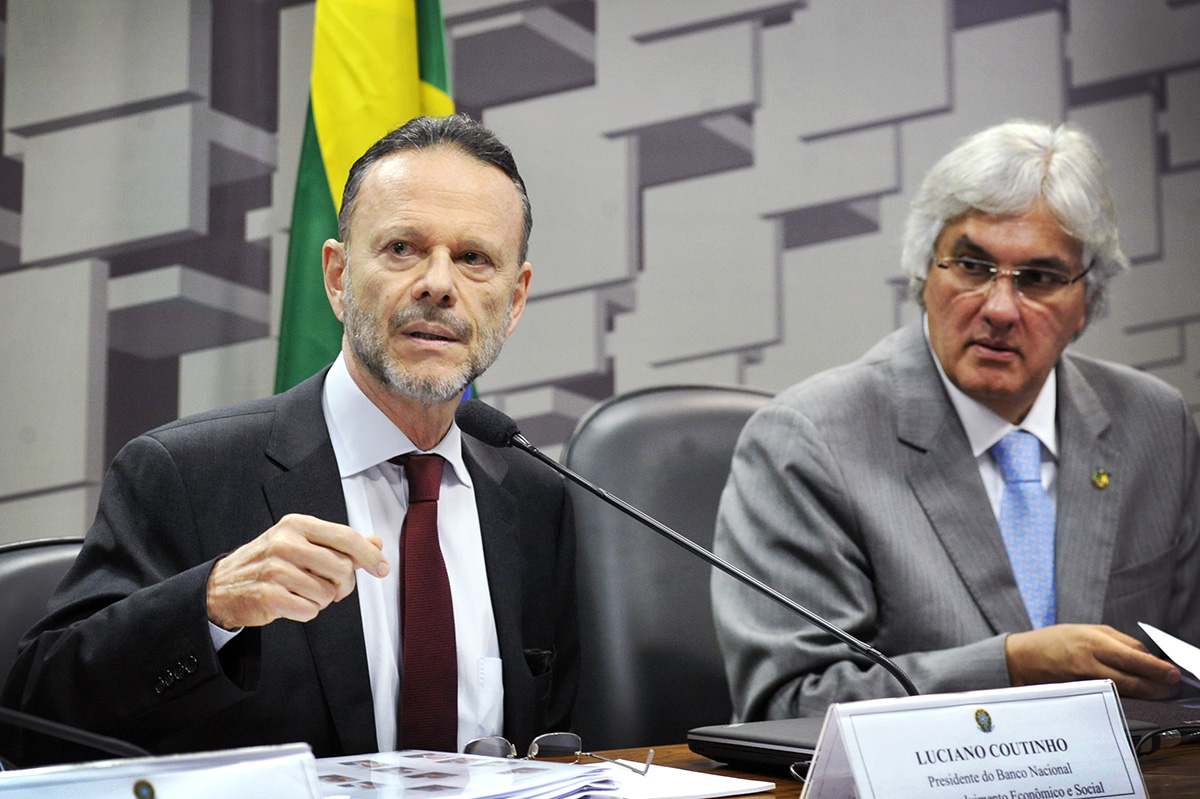Reply to the president of the BNDES
 Luciano Coutinho was questioned on transparency, control mechanisms and the prevention of violationsMesa E/D:
presidente do Banco Nacional de Desenvolvimento Econômico e Social (BNDES), Luciano Coutinho;
presidente da CAE, senador Delcídio do Amaral (PT-MS);
Foto: Geraldo Magela/Agência Senado
Luciano Coutinho was questioned on transparency, control mechanisms and the prevention of violationsMesa E/D:
presidente do Banco Nacional de Desenvolvimento Econômico e Social (BNDES), Luciano Coutinho;
presidente da CAE, senador Delcídio do Amaral (PT-MS);
Foto: Geraldo Magela/Agência Senado
On Tuesday, April 14, the president of the BNDES (Brazilian Development Bank), Luciano Coutinho, attended the joint public hearing staged by the Economic Affairs and the Infrastructure Services commissions of the Senate. Besides debates on the secrecy of operations and questions of an economic nature, Coutinho also had to explain to the senators what is being done to guarantee that the projects financed by the bank respect human rights and contribute to a just, social and equitable development.
On the day before the hearing, Conectas had published three questions that the senators could not fail to ask the president. The questions addressed socio-environmental issues and international investments; grievance mechanisms for affected populations; and the procedures adopted by the bank to ensure that the free, prior and informed consultation of indigenous and traditional peoples is conducted properly.
Conectas and other civil society organizations were present at the session and distributed the questions to the senators who came to the hearing. See below the organization’s replies to the answers given by Coutinho on transparency and human rights:
1) Senator Marta Suplicy asked the president about the control mechanisms and consultations with affected populations. She also asked whether the bank’s Ombuds Office had been reformed pursuant to international standards.
Luciano Coutinho stated that the BNDES complies with legislation and that the contractual clauses contain all the obligations concerning fundamental human rights. He said that the bank maintains ongoing dialogue with civil society and with affected populations. Finally, he emphasized that these issues are in a process of being improved. Click here to read the transcript of his response.
Comment by Conectas: The BNDES contracts have what is called a “Social Clause” that merely requires the borrower to declare that they have not been convicted, in an administrative or legal proceeding, of human rights violations established in Brazilian law, such as environmental crimes, the use of slave labor and the sexual exploitation of minors. The clause makes no mention of numerous other fundamental guarantees, such as the rights of indigenous peoples.
The BNDES has engaged in debates with civil society organizations through the BNDES-Civil Society Dialogue Forum, an extremely important initiative. However, the bank does not maintain direct and systematic dialogue with directly affected populations, or if it does, it does not publicize the practice. Its Ombuds Office is still designed for people who have commercial relations with the bank, particularly micro and small enterprises, and it needs to be more accessible to affected populations.
2) Senator Cássio Cunha Lima read two of the three questions submitted by Conectas. The first referred to the transparency of international investments and requested explanations on why the bank does not release the socio-environmental component of its analysis reports. The second question referred to the mechanisms available for affected communities to report violations.
Luciano Coutinho stated that the BNDES engages in ongoing and regular dialogue through the Civil Society Forum, which he claimed is very important for the bank. In the Forum, he said, the bank aims to make concrete progress in its Social and Environmental Responsibility Policy. Click here to read the transcript of his response.
Comment by Conectas: The BNDES-Civil Society Forum met over the course of 2014 and debated three key topics: Transparency, Socio-Environmental Responsibility Policy and Social Policy. The dialogue has been important for exchanging knowledge and experiences. Some progress was made in this period, such as the improvement in the information available on the “Transparent BNDES” website, but these changes were partly driven by external events – such as legal cases questioning the bank’s interpretation of banking secrecy. To date, the bank has not officially invited civil society to set the agenda of the Forum for 2015.
Also on human rights related topics, Senator Álvaro Dias questioned Coutinho about loans to authoritarian governments that violate human rights and face corruption charges. According to the president, the BNDES has no ideological bias and the process of approving credit is conducted impersonally by a panel observing local legislation. Click here to read the transcript of his response.
In a study published in 2014, Conectas exposed the lack of transparency in the bank’s international investments and the weakness of its procedures for checking that borrowers comply with the human rights legislation of the foreign country. The BNDES commissions opinions and attestations from external consulting and legal firms.
“But these documents are insufficient for a bank whose mission is sustainable development to guarantee there will be no human rights abuses by the financed projects,” said Caio Borges, a lawyer for the Business and Human Rights program at Conectas. “The BNDES needs to conduct an impact assessment and the specific due diligence to prevent human rights violations in the projects it finances.”


